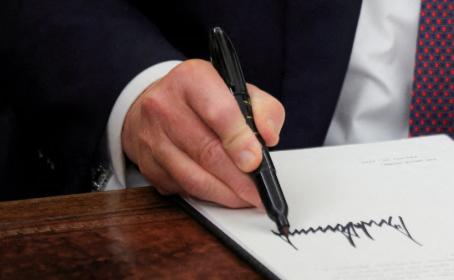The rapid and contentious enactment of more than 200 executive orders by Donald Trump at the outset of his second term has rekindled concerns regarding potential threats to democratic values in the United States. Notably, four specific orders have generated considerable apprehension:
- An unconstitutional effort to abolish birthright citizenship.
- The revival of the Schedule F order aimed at undermining civil service protections.
- The issuance of extensive pardons for individuals involved in the January 6 insurrection.
- The launch of politically motivated investigations into the Biden administration.
Each of these measures poses significant risks to the integrity of democracy and the strength of institutional norms against executive overreach.
Birthright Citizenship Order: A Constitutional Challenge
The 14th Amendment of the U.S. Constitution clearly articulates:
“All persons born or naturalized in the United States, and subject to the jurisdiction thereof, are citizens of the United States.”
Trump’s executive order aims to strip citizenship from children born in the United States to undocumented immigrants, a decision that directly contradicts constitutional protections. His assertion that these migrants are not “subject to the jurisdiction” of the U.S. challenges both legal reasoning and established Supreme Court rulings, particularly the 1898 case United States v. Wong Kim Ark.
This executive action tests the boundaries of institutional checks and balances. Federal employees are mandated to reject unlawful orders, and the judiciary’s response will indicate whether they can successfully defend the Constitution against executive overreach.
Reviving Schedule F: A Pathway to Politicizing the Civil Service
Trump’s reactivation of the Schedule F executive order reopens the possibility for significant alterations within the federal bureaucracy. This classification permits civil servants to be designated as at-will political appointees, making them susceptible to dismissal without justification.
The consequences are profound: as many as 50,000 federal employees—and potentially more—could be terminated and replaced by loyal supporters. This shift would undermine the nonpartisan character of the civil service, effectively transforming the federal government into an extension of the president’s political agenda.
While Biden rescinded the original Schedule F order, the extent to which Trump can advance this renewed initiative may hinge on legal challenges and internal resistance from federal agencies.
Pardoning January 6 Rioters: Incentivizing Political Violence
Trump’s sweeping pardon of around 1,500 individuals convicted of offenses related to the January 6 Capitol insurrection establishes a perilous precedent. Among those granted clemency are notable figures such as Oath Keepers leader Stewart Rhodes.
This decision diminishes accountability and encourages future political violence by suggesting that such actions can be forgiven. Furthermore, it manipulates the pardon power, potentially motivating unlawful conduct by government officials who may anticipate similar leniency. This action also highlights Trump’s apparent disregard for the rule of law.
Politically Motivated Investigations: Utilizing Federal Agencies
Two executive orders issued during the Biden administration focus on the “weaponization” of government and purported “federal censorship,” initiating investigations into several key areas, including:
- Prosecutions related to January 6.
- FBI investigations concerning threats directed at educators.
- Collaboration between federal agencies and social media companies.
These directives grant the attorney general and the director of national intelligence the authority to propose punitive measures for any identified misconduct. While these investigations may ultimately serve as mere symbolic actions, they also pose the risk of being employed as instruments for targeting political adversaries, removing government officials, and launching extensive inquiries into private organizations.
The effectiveness of these orders will largely hinge on the interpretations and implementations by Trump’s nominees for these positions—Pam Bondi and Tulsi Gabbard—if they receive confirmation.
Democracy at a Pivotal Moment
The initial actions taken by Trump in his second term present a crucial challenge to the durability of democratic institutions. The federal bureaucracy, judiciary, and political opposition must confront the difficulties introduced by these orders while upholding the rule of law and safeguarding essential democratic principles.
A failure to adequately counter such initiatives risks normalizing authoritarian practices, with ramifications that could extend well beyond this administration. The forthcoming weeks and months will determine whether American democracy can endure these challenges or if these actions signify the onset of a more profound democratic decline.
